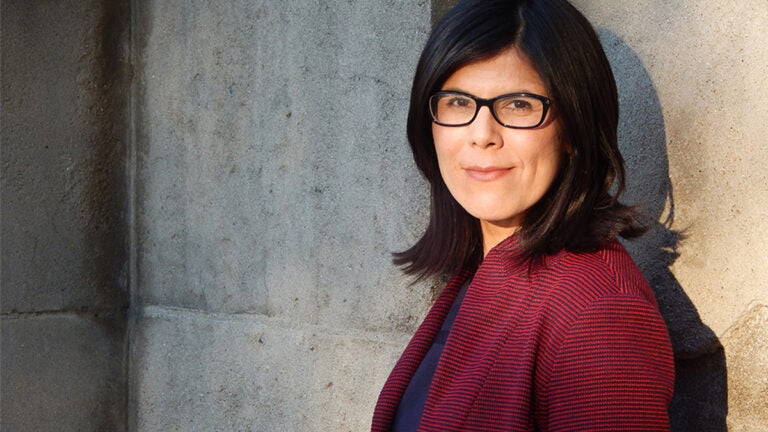
MacArthur Foundation awards Natalia Molina distinguished “genius grant”
Few things excite an academic — or a poet, an artist, a musician, a researcher — as much as the freedom to follow their heart, to explore and push the boundaries of creativity and knowledge. Natalia Molina, professor of American studies and ethnicity at USC Dornsife College of Letters, Arts and Sciences, just expanded her freedom to do that.
Molina has been named a 2020 MacArthur Foundation Fellow. Often referred to as a “genius grant,” the fellowship includes $625,000 in unrestricted support — funding she can use as she sees fit.
“I like to tell my students to leap and the net will appear, and I feel like the net has appeared,” said Molina. “I feel like I can take more chances.”
The foundation awards the fellowships to “talented individuals who have shown extraordinary originality and dedication in their creative pursuits and a marked capacity for self-direction.”
Molina was recognized for her work on race and citizenship in the United States and the way historical narratives of racial difference have been applied to immigrant groups, particularly those of Latinx and Asian origin. Her research reveals how various factors shape modern views of race, not by focusing on a specific group but by exploring how policies and attitudes toward one affect others.
“This is such well-deserved recognition for Natalia Molina and we are so excited for her,” said USC President Carol L. Folt. “Her work is timely and important. She helps us understand complex and nuanced issues regarding immigrant groups in the United States. Dr. Molina asks thoughtful and provocative questions about race, citizenship, and belonging. Rigorous and imaginative work like hers is making a profound difference in the national conversation in these areas.”
Molina has published extensive research through award-winning books and numerous peer-reviewed journal articles and, and she embraces her role as a public scholar, sharing her expertise to help educate and inform the public about social issues. She has traveled extensively, lecturing to the public in Mexico, Cuba, Canada, Europe, China and Japan, and in a majority of the 50 United States.
She is quoted frequently in the news media, and her op-eds and analyses have reached a spectrum of audiences through outlets such as CNN, the Los Angeles Times, The Washington Post, The San Diego Union Tribune, L.A. Taco and La Vida Baseball.
She says the MacArthur Fellowship will help her find new ways of reaching the public.
“You think about what you need to make your humanities work more public facing, such as digital humanities and digital humanities platforms,” she said. “I feel an award like this allows you to be bolder and take chances.”
USC Dornsife Dean Amber D. Miller noted Molina’s work as exemplary of the College’s Academy in the Public Square initiative, which encourages faculty to apply their expertise to various societal challenges.
“Professor Molina’s genius is revealed in the ways that she leverages her expertise on tremendously complex social issues to help communities grapple with relevant challenges of the moment,” Miller said. “She exemplifies the impact that academic researchers can have when they are known for being eager, accessible collaborators with leaders beyond the university.”
A native Angeleno — she grew up in Echo Park — Molina says much of her motivation to explore racial relationships and to find ways to eliminate barriers faced by underrepresented groups stems from personal experience. She was the first in her family to attend college and graduate school, and to embark on a career in academia.
“The supportive professors and the students that were ahead of me, and programs intended to recruit students of color and first-generation students … made becoming a professor a realizable goal,” she said. “These experiences continue to influence me both in showing why those barriers are there in the first place, and how we can overcome them.
“If we understand the many historical factors that shaped where we are today, then we have the power to reimagine where we go from here,” she added.
Molina, who is the sixth USC Dornsife faculty member, and the eighth at the university, to receive a MacArthur Foundation Fellowship, says she feels honored to be among colleagues who are making a difference. She cites their positive impact — and that of all her fellow faculty members — as an important reason why she joined USC Dornsife in 2018.
“My grandmother used to say, ‘Dime con quién andas, y te diré quién eres,’ which in English is ‘tell me who your friends are, and I’ll tell you who you are.’ And I think for me it was, ‘Tell me who your colleagues are, and I’ll show you how your work can grow.’
“I came to the department because my colleagues had presented work that I felt made the world a better place,” she said. “I can say that for many of my colleagues in Dornsife. And they help you be more creative, help you make connections between ideas and help you develop as a thinker and as someone who hopes to contribute to society.”
Molina is one of 21 fellows selected this year by the Chicago-based John D. and Catherine T. MacArthur Foundation. She joins the following USC faculty who claim that distinction: University Professor Viet Thanh Nguyen, Aerol Arnold Chair of English and professor of English, American studies and ethnicity and comparative literature; University Professor Jacob Soll, professor of history and accounting; Maggie Nelson, professor of English; Jay Rubenstein, professor of history; Josh Kun, professor of communication and American studies and ethnicity; Elyn Saks of USC Gould School of Law; and Luis Alfaro of the USC School of Dramatic Arts.